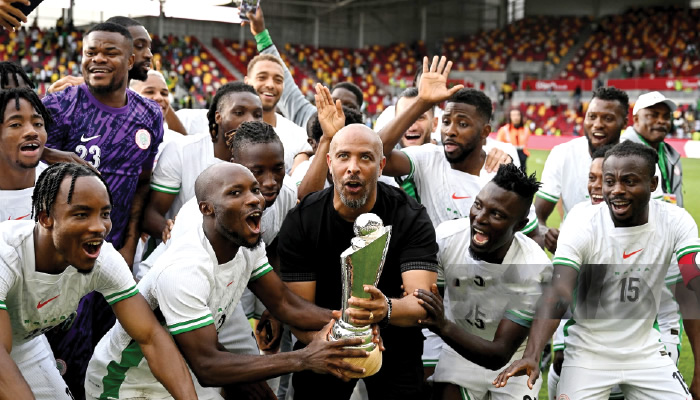The Super Eagles of Nigeria defeated Jamaica 5-4 on penalties on Saturday to claim the Unity Cup title after both teams played out a thrilling 2-2 draw at Brentford Community Stadium in London.
Moses Simon and Samuel Chukwueze scored in each half for Nigeria, but Jamaica’s resilient Reggae Boyz fought back to force the contest into a penalty shootout, where the Super Eagles held their nerve to secure victory.
The triumph marks Nigeria’s second Unity Cup title, having previously won the tournament’s inaugural edition in 2004, and caps off a successful campaign for coach Eric Chelle, who secured his third win in four matches since taking charge of the three-time African champions.
The 2025 Unity Cup, held from May 27 to 31 at Brentford Community Stadium, served as a vibrant celebration of cultural heritage and football, bringing together four teams – Nigeria, Ghana, Jamaica, and Trinidad & Tobago – in a tournament organised to foster unity and pride among the African and Caribbean diasporas in London.
My Daughter Was Preparing For Her Masters In UK Before Train Crash – Father Of Corps Member| Punch
This year’s edition was particularly poignant, marking the return of the tournament after its last occurrence in 2004, underscoring its importance in promoting cultural understanding and community cohesion amongst different races in the United Kingdom.
Path to the final
Nigeria’s route to the final was far from straightforward. The Super Eagles secured their place in Saturday’s showpiece with a hard-fought 2-1 victory over Ghana on Wednesday night, a match that saw them surrender a commanding 2-0 lead before goalkeeper Stanley Nwabali produced crucial saves to preserve their advantage.
Cyriel Dessers had opened the scoring in the 14th minute with a clinical finish, assisted by S. Ismail, before Ghana’s Razak Simpson accidentally turned the ball into his own net five minutes later. However, Brandon Thomas-Asante’s 70th-minute strike for the Black Stars ensured a nervy finish for the Super Eagles.
Jamaica, meanwhile, booked their final berth with an equally dramatic 3-2 victory over Trinidad and Tobago on Tuesday. The Reggae Boyz had led 2-0 against the Soca Warriors only to see their opponents draw level, before a fortuitous added-time penalty secured their progression to the final.Related News
Historical context
The final represented a reunion of sorts for Nigeria and Jamaica, who previously entertained fans in Kingston with a memorable 2-2 draw in a friendly match prior to the 1998 FIFA World Cup finals in France. Saturday’s encounter at the Gtech Community Stadium proved equally entertaining, though it took penalties to separate the two sides.
For Chelle, the opportunity to lift a trophy after just four matches in charge of Nigeria added extra appeal to the occasion. The French tactician had used the tournament as a platform to assess domestic talent, calling up 10 home-based players as part of his squad rotation strategy.
The Unity Cup’s return after a 21-year hiatus highlighted its enduring significance as a platform for fostering relationships between communities with shared heritage. The tournament successfully delivered on its sporting, cultural and friendship objectives, providing cutting-edge entertainment whilst allowing different races in the United Kingdom to bond and experience the vibrancy of African and Caribbean football culture.
Tournament legacy
This year’s tournament reinforced the Unity Cup’s status as more than just a football competition. Beyond the goals, saves and penalties, it served as a celebration of diversity and unity, drawing fans from across the globe to witness the cultural connections that bind the African and Caribbean diasporas.
Nigeria’s victory ensures they remain the most successful team in Unity Cup history, having now won both editions of the tournament. For Jamaica, despite the penalty heartbreak, their journey to the final marked a significant achievement and demonstrated the growing strength of Caribbean football on the international stage.
The success of the 2025 edition suggests the Unity Cup has firmly re-established itself as an important fixture in the football calendar, providing a unique platform for cultural exchange and sporting excellence that extends far beyond the 90 minutes on the pitch.

